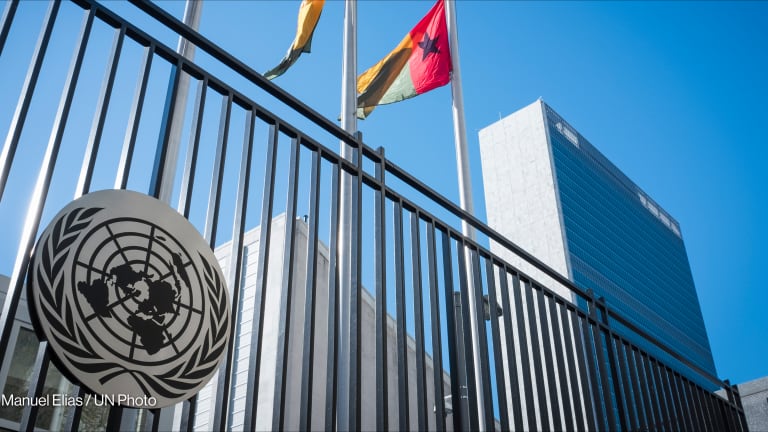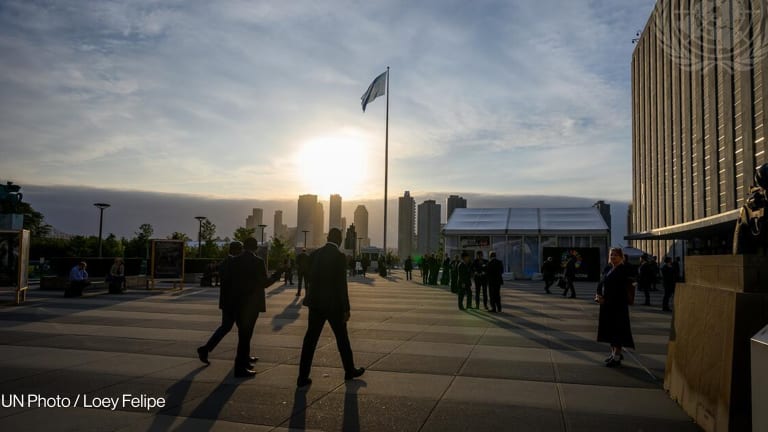UN General Assembly casts spotlight on split between rich and poor

While U.S. President Joe Biden and his European colleagues sought to focus the world’s attention on Russia’s invasion of Ukraine, leaders from the global south had other things on their mind.
Pakistan’s Prime Minister Shahbaz Sharif didn't even mention the war in his address to the United Nations General Assembly, and instead used his time at the podium to draw attention to the apocalyptic monsoon that has flooded a third of his country, warning that the scene of global warming-induced destruction is merely a portent of what awaits the rest of the world.
“More than 1,500 of my people have perished in the great flood,” he told the gathering of world leaders. “Pakistan has never seen a more stark and devastating example of the impact of global warming.”
The Pakistani leader said “the undeniable truth is that this calamity has not been triggered by anything we have done,” he added, noting that Pakistan is one of 10 countries in the world most vulnerable to climate change but has generated less than 1% of global emissions.
Sharif was one of many world leaders from lower-income countries who veered away from the U.S. script and instead expressed a growing resentment toward their wealthy northern neighbors that are seeking solidarity from the south in Ukraine’s defensive war against Russia, but which they feel have again and again fallen short on their promises to address a range of disasters that are existential to them.
“Trust is not created when countries pledge $100 billion per annum for climate finance and then deliver a fraction to developing countries.”
— Mia Mottley, prime minister, BarbadosA perfect storm of crises — including a deadly pandemic, climate-induced drought and famine, Russia’s war in Ukraine that has jacked up prices of food and fuel around the world, and supercharged global inflation rates — has exacerbated traditional tensions between the global north and global south. It has also all but stalled progress on the U.N. Sustainable Development Goals, a list of 17 targets the international community established in 2015 to improve the quality of life for the world’s neediest. Halfway to 2030, the effort to achieve those goals has largely stalled.
Two realities
The split screen diagnoses of the world’s most pressing crises played out during a week of nonstop speechifying at the U.N. General Assembly’s general debate, which opened on Tuesday with a lineup that featured a virtual address by Ukrainian President Volodymyr Zelenskyy and which is set to wrap up today. It was the first time that world leaders came together in New York for a fully in-person General Assembly session since the pandemic began.
The Pro read:
The US sub-Saharan Africa strategy: A new era, or words on paper?
The White House's new sub-Saharan Africa strategy focused on both old objectives — democracy and governance — and some new ones, including more commercial and trade ties with the region. But experts warn the test comes with implementation.
It offered debuts by a set of new leaders, including German Chancellor Olaf Scholz and U.K. Prime Minister Liz Truss. Iranian President Ebrahim Raisi took advantage of his first visit to the U.N. as Iran’s leader to criticize U.S. and European sanctions against his country and to denounce the legacy of American-led wars in the Middle East. But he skirted any mention of his government’s violent crackdown on protesters, angered over the death of a young woman who was placed in the custody of Iran’s morality police for violating a law requiring women to wear a hijab in public.
Scores of private charities, humanitarian agencies, health and climate experts, development professionals, and celebrities —including United Nations Population Fund goodwill ambassador Ashley Judd, who spoke at the Devex conference, convened on the sidelines of the U.N. gabfest —attended a series of conferences hosted by Devex, the Clinton Global Initiative, Bloomberg Philanthropies and the Concordia Summit.
As the U.S. pressed the international community to apply greater pressure on Russia to end its military occupation of eastern Ukraine, it also sought to push back on the notion that it is blind to the suffering of lower-income governments. In an effort to highlight its leadership role on global health, the U.S. hosted the Sept. 21 seventh replenishment meeting to fund the Global Fund to Fight AIDS, Tuberculosis and Malaria. The meeting raised $14.25 billion, nearly $4 billion short, but more than the fund raised in its previous replenishment session.
Speaking at the Clinton Global Initiative, the Irish rock star, Bono, took a poke at the U.K.’s new leadership, noting that the U.K. would not announce a new pledge to the Global Fund at last week’s meeting, “because they are in mourning and were sad and we’re sad with them … but what we know of Queen Elizabeth II is that if she had an appointment to keep, she kept it.”
Hostile climate
World Bank President David Malpass also caught some flack after he repeatedly refused to answer a question from New York Times reporter David Gelles about whether he believed man-made emissions were to blame for global warming.
Malpass backtracked in an interview with Politico’s Ryan Heath, explaining, “When asked, ‘Are you a climate denier?’ I should’ve said no,” he said, “It was a poorly chosen line, I regret that, because we as an organization are using the science every day.”
Still, the disconnect between high-income and low-income countries has fueled an increasing sense of alienation from the north among lower-income countries that have seen a raft of commitments — from climate adaptation funds to ending poverty, hunger and a host of other Sustainable Development Goals, to making vaccines available equitably around the world — fall well short of expectations.
In an address to the General Assembly, Barbados’ Prime Minister Mia Mottley denounced the practice of “vaccine nationalism and outright shameless hoarding” in high-income countries, recalling that only 576 million doses of vaccine had been made available to lower-income countries, while high-income nations “held on to 7.5 billion doses.”
“Where is the justice in that? Where is the global solidarity?” she said.
“Trust is not created when countries pledge $100 billion per annum for climate finance and then deliver a fraction to developing countries; or commit to 0.7% of GDP as ODA [official development assistance], but don’t give it,” she added.
French President Emmanuel Macron sought to challenge those low- and middle-income nations which have sought to overlook Russia’s aggression in Ukraine.
“I know that here, many cherish a feeling of injustice because of economic, energy and all of the other dramatic consequences because of the war conducted by Russia, and that there are countries here that have chosen a form of neutrality,” Macron told the General Assembly. “Those who are keeping silent today are actually in a way complicit with the cause of the new imperialism, a new world order that is trampling over the current order.”
But in what appeared to be something of a veiled retort, Macky Sall, the president of Senegal, a former French colony, said, “I have come to say that Africans have suffered enough of the burden of history, that it does not want to be the place of a new Cold War, but a pole of stability and opportunity open to all of its partners.”
Africa, he added, wants to engage with all of its partners in a “reinvented relationship that transcends the prejudice that ‘whoever is not with me is against me.’”
The situation is only set to get worse, according to Achim Steiner, the administrator of the U.N. Development Programme, who said that the world is facing a crisis of trust. For the first time on record, the U.N. agency’s Human Development Index, a measurement of human well-being, has gone backwards for two years in a row, a development that is placing the SDGs increasingly out of reach.
“When you see the economic signals that are on the horizon in terms of inflation, escalating debt, global recession, I think it is fair to say that we have some fairly rough weather ahead of us,” Steiner told Devex.
Few places on the globe are facing a greater climate-related crisis than in the Horn of Africa, which, according to the World Food Programme, is experiencing its driest season in more than 40 years.
“The food and health crisis in the Horn of Africa is a shocking reality and we do not have enough funds to protect populations,” Ibrahima Socé Fall, an assistant director-general at the World Health Organization, tweeted. “Over 80 Million of people are facing food insecurity with millions of them already in starvation and limited access to essential health services.”
Abby Maxman, the president and CEO of Oxfam America, just returned from Somaliland, the breakaway region of Somalia, which is on the brink of famine.
Maxman recalled speaking to a 74-year-old pastoralist at a camp for those displaced by drought. “He said it was the worst drought in his lifetime; he was down to one meal a day.” A 38-year-old mother of eight, named Sophie, was forced to seek refuge at the outskirts of the camp after a pack of hyenas began encircling her home.
Maxman voiced concern that the plight of the world's poorest is not getting the attention it needs.
She said that the “backsliding” on several of the Sustainable Development Goals — particularly those calling for the elimination of poverty, hunger, and gender equality — are being exacerbated by the war in Ukraine.
The hardest truth to swallow however, she said, is that “those least responsible for any of this are bearing the brunt.”
Search for articles
Most Read
- 1
- 2
- 3
- 4
- 5








